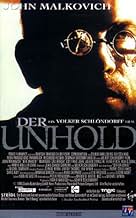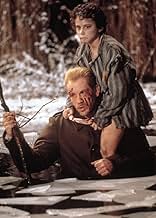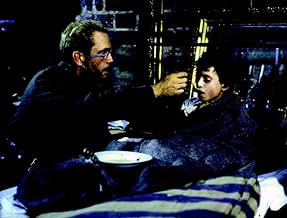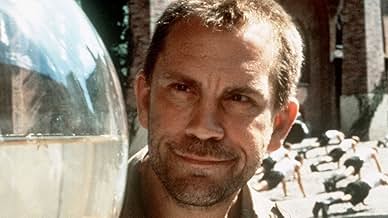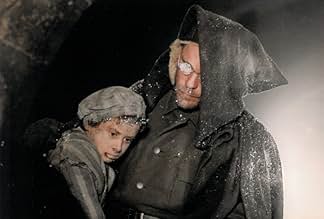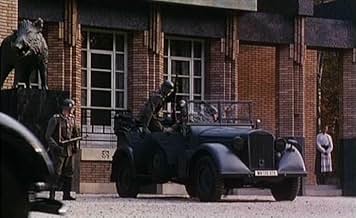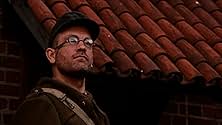Der Franzose Abel Tiffauges mag Kinder und will sie vor den Erwachsenen schützen. Fälschlicherweise als Kinderschänder verdächtigt, wird er als Soldat im 2. Weltkrieg rekrutiert, gerät aber ... Alles lesenDer Franzose Abel Tiffauges mag Kinder und will sie vor den Erwachsenen schützen. Fälschlicherweise als Kinderschänder verdächtigt, wird er als Soldat im 2. Weltkrieg rekrutiert, gerät aber sehr bald in KriegsgefangenschaftDer Franzose Abel Tiffauges mag Kinder und will sie vor den Erwachsenen schützen. Fälschlicherweise als Kinderschänder verdächtigt, wird er als Soldat im 2. Weltkrieg rekrutiert, gerät aber sehr bald in Kriegsgefangenschaft
- Regie
- Drehbuch
- Hauptbesetzung
- Auszeichnungen
- 1 Gewinn & 1 Nominierung insgesamt
Empfohlene Bewertungen
The film abounds in caricatures beginning with an outdoor picnic by complacent, indeed moronic, French officers who fail to even remotely perceive the danger of the onrushing Wehrmacht. Reichsmarshall Goring is portrayed as a grinning fool except when he approaches the state of barking madness. This is a legitimate dramatic device but the real Goring, cured before World War II of doctor-induced morphine addiction, was more complex and, in that sense, more interesting (decades ago I took a psychology course with Dr. Gilbert, who examined Goring at Nuremberg and wrote a book about the experience which is still available in second-hand bookshops. HIS Goring was chilling, no one to laugh at.).
The film is most effective when it eerily recreates what must have been the almost erotic attraction of nighttime rallies with flags, bunting, torches and the steady beat of martial music. That little boys were inculcated with the madness of Nazism through these rituals is powerfully shown here.
It was hard for me to care about Abel one way or the other but the character is well-acted as are the other main roles.
This strange and original work is a French film about Nazi Germany done in English. There are no subtitles. Director Volker Schlondorff is German, the screenplay is by veteran French writer Jean-Claude-Carriere, who has scores of films to his credit including Bell de Jour (1967) and Valmont (1989), and the star is the American, John Malkovich, who plays a French simpleton named Abel Tiffauges who ends up as a servant in Field Marshall Herman Goering's hunting estate during World War II, and then later in a Hitler youth academy for boys.
Malkovich's Abel is enormously sympathetic because he has suffered but harbors no bitterness, because he genuinely loves children, and because he has a certain magic about him based on his childish belief that somehow he will survive any catastrophe. In a boy's home as a child he survives the brutality of a proto Goering-like fat boy, and then later as an auto mechanic he overcomes a false accusation of child molestation. Both of these little stories are vividly rendered and seem entirely realistic. Then begins Abel's war time adventures, and it is here that the story becomes, as some have observed, something of a fairy tale. Abel is able to leave his barracks at the prison to wander about where he meets a blind moose and then a German army officer at a deserted cabin in the woods. This leads to his being established at Goering's hunting estate, and from there to the Hitler youth academy where he is treated as a privileged servant. We see the Nazis as just another part of the bizarre personages of his world.
The depiction of Goering as a kind of self-indulgent Nero, living in opulence as the world burns, seemed entirely believable. The overall portrait of the Germans in an objective and balanced manner was refreshing and thought-provoking and one of the strengths of the film. The Nazi eugenicist is contrasted with the officer who was part of a failed plot against Hitler, both men enormously sincere and dedicated, the one unbalanced, the other unlucky.
This is not a film for those looking primarily to be entertained. This is a work of art, dark, uneven, and a bit curious.
This is the story of Abel, an affable simpleton from France with a love of children and animals (no, there are no undertones of pedophilia). Prior to WWII, he is wrongly accused and convicted of child molestation. While working in the work camps, he is captured by the Germans and through a series of events ends up as a prisoner of war worker in a training school for Hitler youth. He is emotionally seduced by the romantic notions of Hitler's national socialism and the great devotion to the fatherland that is being taught there. And of course, he loves working with the boys. The Germans notice this and how much the boys like him as well, so they ask him to recruit more boys for the school from the local countryside. Things go along well until the Russians invade and the only defense of the school must be made by the students (who are well trained in the art of war).
This is a terrific story that gives us a more realistic look inside Germany during the war. No, it wasn't an idyllic free society. But it wasn't exactly a factory for mechanized inhuman killers as it has been routinely portrayed either. We come to understand that what we considered evil was being presented to the children in terms that seemed good and noble. They felt as if they were on an idealistic quest, not on a diabolical mission of subjugation.
The direction of this film was expertly done. Volker Schlondorff's presentation of the story, though slow moving at times, offered an excellent character study of Abel and was patient in proffering revealing looks at the people and the feelings of those around him.
Malkovich is fantastic as the naïve and slow witted Abel. He is wonderfully childlike and sincere in his portrayal; reminiscent of his role in Of Mice and Men'. This is the best I can remember him in quite some time.
This is a poignant and compelling film of substance. I rate it a 9/10. The sophisticated viewer will enjoy it.
Wusstest du schon
- WissenswertesGerard Depardieu was slated for the lead role
- PatzerPrior to the school fire, a caption says "Paris 1925". Upon his arrest as an adult, Abel, through his narration, remembers the fire as having happened "twenty years ago". This would place his adult scenes in 1945, but when he joins the French army after his arrest it is before the German occupation of Paris which would place his arrest in 1940. However, Abel is slow-witted and possibly does not have an accurate sense of time.
- Zitate
Count von Kaltenborn: This whole beautiful country, to which we have given our souls, is utterly doomed. It's going to be wiped out of human memory. Our entire heritage, even our name, our ancestors' names, wiped out, all wiped out!
- VerbindungenFeatured in Hollywood Profile: John Malkovich (1998)
Top-Auswahl
- How long is The Ogre?Powered by Alexa
Details
- Erscheinungsdatum
- Herkunftsländer
- Sprachen
- Auch bekannt als
- The Ogre
- Drehorte
- Produktionsfirmen
- Weitere beteiligte Unternehmen bei IMDbPro anzeigen
Box Office
- Bruttoertrag in den USA und Kanada
- 50.935 $
- Weltweiter Bruttoertrag
- 50.935 $
- Laufzeit
- 1 Std. 58 Min.(118 min)
- Farbe
- Sound-Mix
- Seitenverhältnis
- 1.85 : 1

